|
|
|
Sort Order |
|
|
|
Items / Page
|
|
|
|
|
|
|
| Srl | Item |
| 1 |
ID:
110305


|
|
|
|
|
| Publication |
2012.
|
| Summary/Abstract |
In the United States, the decision to go to war has often been propelled by a singular event, a 'trigger' that both galvanises and unites, at least temporarily, the US Congress, the nation's press and the American public. The attack on Pearl Harbor precipitated US entry into the Second World War, and the attack on the World Trade Center on 11 September 2001 led to American military involvement in Afghanistan. In both instances, thousands of innocent Americans had been killed on American soil by an easily identifiable, foreign enemy. The United States entry into the Korean War resulted from a somewhat different kind of trigger. While US forces were not directly attacked, there was, as President Lyndon Johnson's Deputy Undersecretary of State George Ball once wrote, 'a massive land invasion by 100,000 troops … a classical type of invasion across an established border'. Ball argued that North Korea's invasion of South Korea in June 1950 provided 'an unassailable legal and political basis for counteraction'.
|
|
|
|
|
|
|
|
|
|
|
|
|
|
|
|
| 2 |
ID:
033904
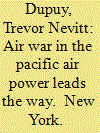

|
|
|
|
|
| Publication |
New York, Franklim Watts, Inc., 1964.
|
| Description |
88p.Hbk
|
| Series |
Military History of World War II
|
| Contents |
Vol. XIII
|
|
|
|
|
|
|
|
|
|
|
|
Copies: C:1/I:0,R:0,Q:0
Circulation
| Accession# | Call# | Current Location | Status | Policy | Location |
| 008105 | 940.54/DUP 008105 | Main | On Shelf | General | |
|
|
|
|
| 3 |
ID:
028343
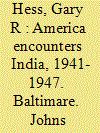

|
|
|
|
|
| Publication |
Baltimare, Johns Hopkings Press., 1971.
|
| Description |
xi, 211p.: bib.hbk
|
| Standard Number |
0801812585
|
|
|
|
|
|
|
|
|
|
|
|
Copies: C:1/I:0,R:0,Q:0
Circulation
| Accession# | Call# | Current Location | Status | Policy | Location |
| 010074 | 954.0359/HES 010074 | Main | On Shelf | General | |
|
|
|
|
| 4 |
ID:
100729
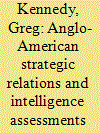

|
|
|
|
|
| Publication |
2010.
|
| Summary/Abstract |
The historiography of Western intelligence assessments of Japanese military power and prowess, particularly before the Pearl Harbor attack in December 1941, is littered with accusations of racism, ignorance, arrogance, and incompetence, which are portrayed as having created one of the most serious underestimations of a modern power's military capabilities. However, cultural and racial biases will always exist in professional military establishments because their competitiveness and emphasis on morale lead some untrained minds to undervalue systems possessing values different from their own. This article will reassess the influences of racism on Anglo-American appreciations of Japanese air power, and its development, in the seven years before the attack on Pearl Harbor.
|
|
|
|
|
|
|
|
|
|
|
|
|
|
|
|
| 5 |
ID:
085783
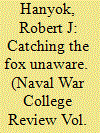

|
|
|
|
|
| Publication |
2008.
|
| Summary/Abstract |
The attack on the U.S. Pacific Fleet by the aircraft of the Japanese Striking Force (Kido Butai) at Pearl Harbor on the morning of 7 December 1941 was a total surprise to the American commands in Hawaii and Washington. The completeness of the operational surprise-the Imperial Japanese Navy had gathered the force, trained it, concentrated it, and sent it to the launch point without discovery by American intelligence, especially its radio component- was due largely to the success of the Japanese cover plan of radio denial and deception in hiding the existence, makeup, purpose, and timing of the attack. The Japanese navy's denial and deception plan left American radio intelligence, known also as "communications intelligence," with only scraps of information about the Japanese fleet's movements during the weeks prior to the attack.
|
|
|
|
|
|
|
|
|
|
|
|
|
|
|
|
| 6 |
ID:
029985
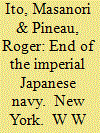

|
|
|
|
|
| Publication |
New York, W.W. Norton & Company Inc., 1962.
|
| Description |
240p.hbk
|
|
|
|
|
|
|
|
|
|
|
|
Copies: C:1/I:0,R:0,Q:0
Circulation
| Accession# | Call# | Current Location | Status | Policy | Location |
| 007939 | 952.04/ITO 007939 | Main | On Shelf | General | |
|
|
|
|
| 7 |
ID:
151376
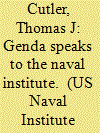

|
|
|
|
|
| Summary/Abstract |
Was it wrong for the Naval Institute to invite a man who helped orchestrate the Japanese attack on Pearl Harbor to deliver an address?
|
|
|
|
|
|
|
|
|
|
|
|
|
|
|
|
| 8 |
ID:
067347
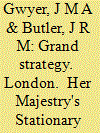

|
|
|
|
|
| Publication |
London, Her Majestry's Stationary Office, 1964.
|
| Description |
xv, 401p.Hbk
|
| Series |
United Kingdom Military Series
|
| Contents |
Vol.III: June 1941-August 1942
|
|
|
|
|
|
|
|
|
|
|
|
Copies: C:1/I:0,R:0,Q:0
Circulation
| Accession# | Call# | Current Location | Status | Policy | Location |
| 009221 | 940.53/GWY 009221 | Main | On Shelf | General | |
|
|
|
|
| 9 |
ID:
132122
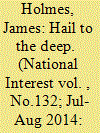

|
|
|
|
|
| Publication |
2014.
|
| Summary/Abstract |
IT'S EASY to forget the virtues of submarines, which lurk beneath not only the waters but also the consciousness of most Americans. They aren't as iconic as fighter jets or as visceral as tanks. But they can deny a stronger enemy navy control of important waters. Afterward they can exercise command of the sea, blockading or projecting power onto enemy shores with impunity. These elusive warships, in other words, pack an outsized punch.
|
|
|
|
|
|
|
|
|
|
|
|
|
|
|
|
| 10 |
ID:
045011
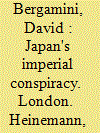

|
|
|
|
|
| Publication |
London, Heinemann, 1971.
|
| Description |
xxxviii,1239p.hbk
|
|
|
|
|
|
|
|
|
|
|
|
Copies: C:1/I:0,R:0,Q:0
Circulation
| Accession# | Call# | Current Location | Status | Policy | Location |
| 013098 | 952.03/BER 013098 | Main | On Shelf | General | |
|
|
|
|
| 11 |
ID:
104253
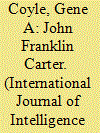

|
|
|
| 12 |
ID:
151375
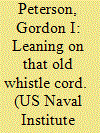

|
|
|
|
|
| Summary/Abstract |
A Navy veteran-turned-civilian machinist at Pearl Harbor Naval Shipyard had “the unusual presence of mind” to sound the air raid alarm 75 years ago, never thinking he was witnessing one of the most cataclysmic
|
|
|
|
|
|
|
|
|
|
|
|
|
|
|
|
| 13 |
ID:
106432
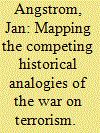

|
|
|
|
|
| Publication |
2011.
|
| Summary/Abstract |
This article maps the historical analogies of the war on terrorism used by the Bush administration. It identifies four historical analogies of the war on terrorism present in the US political and academic discourse since the attacks on 11 September 2001. These are the war on terrorism as: (a) the Second World War; (b) the Crusades; (c) the Vietnam War; and (d) the Cold War. These analogies have been a constant presence in the US discourse, although the analogy with the Crusades has been more prominent in the academic discourse than in the political. There is, moreover, no conclusive pattern of when and how these analogies have been used, suggesting that we cannot use them to evaluate how well the war on terrorism is progressing. This also indicates that the Bush administration, with one exception, was not successful in framing the policy agenda in a certain direction regarding the war on terrorism. Understanding the war on terrorism as a new Cold War, for example, still implies different policy measures such as roll-back and containment.
|
|
|
|
|
|
|
|
|
|
|
|
|
|
|
|
| 14 |
ID:
100270
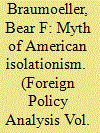

|
|
|
|
|
| Publication |
2010.
|
| Summary/Abstract |
International relations scholarship often describes America's foreign policy tradition as having isolationist tendencies or an isolationist dimension, a characterization derived most directly from American security policy in the 1920s and 1930s. This article offers a critique of this characterization. American diplomacy in the 1920s was subtle but ambitious and effective. American policy in the years leading up to the bombing of Pearl Harbor was in fact quite responsive to events on the European continent. In short, American isolationism is a myth.
|
|
|
|
|
|
|
|
|
|
|
|
|
|
|
|
| 15 |
ID:
124373
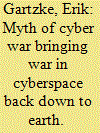

|
|
|
|
|
| Publication |
2013.
|
| Summary/Abstract |
A blitz of media, punditry, and official pronouncements raise the specter of war on the internet. Future conflicts may well take place in cyberspace, where victory or defeat could be determined in mere "nanoseconds."1 Secretary of Defense Leon Panetta has even warned of a "cyber-Pearl Harbor."2 Nor are fears of cyberwar abstract speculation. Events such as the denial of service attacks against Estonian and Georgian government websites, the Stuxnet worm designed to disable Iranian nuclear centrifuges, and the recent hacking of U.S. military computer networks seem to indicate that the era of cyberwar has already arrived.
|
|
|
|
|
|
|
|
|
|
|
|
|
|
|
|
| 16 |
ID:
127375
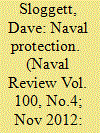

|
|
|
| 17 |
ID:
095526
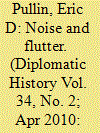

|
|
|
|
|
| Publication |
2010.
|
| Summary/Abstract |
After the Japanese attack at Pearl Harbor, the administration of Franklin D. Roosevelt recognized that India possessed impressive military and industrial capacities, but he concluded that its anticolonial struggle for independence from the British Empire placed those capacities in doubt.1 At the same time, the administration observed an increasing connection between diplomatic goals and information activities.2 Although appreciating the importance of propaganda in international affairs, the administration failed to articulate the role and purpose of American information activities. The failure stemmed in large part from the Roosevelt administration's ambivalence about its policies concerning the British Empire and Indian nationalism. The Office of War Information (OWI), the organization responsible for U.S. propaganda abroad, received precious little direction from Washington concerning strategy or operations in India. Initially left on its own in India, the OWI attempted to generate goodwill by presenting the United States as the world's defender of democracy. Instead, American propaganda fostered suspicion among the British and Indians about U.S. motives. The OWI even confounded American diplomats, such as William Phillips, the second personal representative appointed by President Roosevelt in India, who warned that, "The Indians too may well be wondering whether we Americans are really going to displace the British by turning the attention of Indians to American methods, production and ideals.
|
|
|
|
|
|
|
|
|
|
|
|
|
|
|
|
| 18 |
ID:
149294
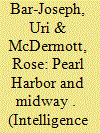

|
|
|
|
|
| Summary/Abstract |
Beginning with the attack on Pearl Harbor, the war in the Pacific was a largely losing campaign for the Americans until the Battle of Midway, on 4–5 June 1942. The American ability to predict this Japanese attack the second time around served as the turning point for the war in the Pacific. And the story of how the Americans turned a catastrophic failure into an impressive cryptological achievement involved the story of one man, Joe Rochefort, convincing another man, Admiral Chester Nimitz who commanded the Pacific Fleet, that he could trust his analysis of the intelligence he compiled and analyzed.
|
|
|
|
|
|
|
|
|
|
|
|
|
|
|
|
| 19 |
ID:
191655
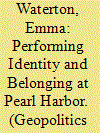

|
|
|
|
|
| Summary/Abstract |
Prior to 7 December 1941, Pearl Harbor was perhaps best known for its associations with the Hawaiian Shark Goddess, its pearl-producing oysters and as a strategically important US naval base. It was not until 1962, some twenty years after its attack during World War II, that it emerged as a place of heritage, when the USS Arizona Memorial was first opened to the public. Transformed from a place of war to a place of heritage and finally into a prepared touristic experience, Pearl Harbor today transmits, absorbs and constructs a range of personal and nationally based meanings about the past. It thus provides a vivid case study through which to interrogate the construction of heritage in a politically charged, contested and institutionally mediated environment. Drawing on the reflexive responses of 73 visitors, collected through in-depth, onsite interviews with domestic tourists, the paper unfolds around two key themes: (1) the varied ways in which visitors come to terms with a ‘dark’ national past; and (2) the affective entanglements that emerge from such efforts and concomitant attempts to understand their visit as a performance of national identity.
|
|
|
|
|
|
|
|
|
|
|
|
|
|
|
|
| 20 |
ID:
036811
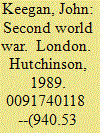

|
|
|
|
|
| Publication |
London, Hutchinson, 1989.
|
| Description |
608p.Hbk
|
| Standard Number |
0091740118
|
|
|
|
|
|
|
|
|
|
|
|
Copies: C:1/I:0,R:0,Q:0
Circulation
| Accession# | Call# | Current Location | Status | Policy | Location |
| 030858 | 940.53/KEE 030858 | Main | On Shelf | General | |
|
|
|
|
|
|
|
|
|